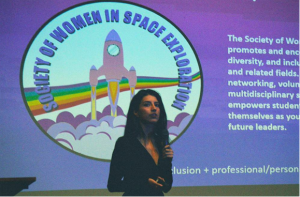August 26, 2019
Women’s Equality Day Q&A with Bianca Vasquez
Posted by Caitlin Bergstrom
 August 26th is Women’s Equality Day. To celebrate women’s contributions to Earth and space science, we’re devoting this week to featuring Q&As with inspirational women in STEM. #WomensEqualityDay!
August 26th is Women’s Equality Day. To celebrate women’s contributions to Earth and space science, we’re devoting this week to featuring Q&As with inspirational women in STEM. #WomensEqualityDay!
Today, we’re thrilled to feature Bianca Vasquez, Test Site Engineering-Propulsion Intern at Virgin Orbit and founder of the Society of Women in Space Exploration (SWISE). Bianca is studying Mechanical Engineering at Santa Barbara City College. Find Bianca and SWISE on social media, @PinkRocketship and @SWISEofficial.
What inspired you to become a scientist?

I feel like a lot of people are interested in space when they’re kids, but I didn’t really think STEM was a career option for me until I came to college. Even then, I started taking computer science classes and I did well, but noticed I didn’t like going to class because of the social aspect of the “boys club.” So I thought, okay, STEM isn’t for me. But I continued to explore subjects like astronomy and astrophysics, which I did well in. On my own time I learned about the new space industry and all the exciting new stuff that Virgin Orbit and SpaceX are doing.
Then, I got to go to the first SpaceX West Coast launch at Vandenberg, which was pretty crazy. It’s one thing to see it on the internet, but to be there, to feel the sonic booms in your body, that’s a whole other thing. I almost cried: there were colors in the sky and so much excitement all around me! It was after that that I thought to myself, “I want to do this.” But because of things I mentioned earlier, like sexism, I felt like I wouldn’t fit into space culture, so that’s when I started SWISE.
Have you faced any barriers on your path to your current position?
 Yes and no. Yes because yes! So many barriers. And I say no because it was those barriers that lead me to where I’m at today. I try to welcome any challenge, any barrier, anything negative coming my way; I cherish those things and use them as fuel. Because of sexism and gender imbalance, I was inspired to start SWISE and encourage girls to pursue space exploration careers. I didn’t grow up with a lot of money, but SWISE doesn’t need to run off of money. I set it up in that way. That’s the fun part about it! We’ll never go, “we can’t function because we don’t have X amount of money in the bank.” Anything that’s a challenge or a difficulty, I use that, I flip it, and I use it to build the kingdom.
Yes and no. Yes because yes! So many barriers. And I say no because it was those barriers that lead me to where I’m at today. I try to welcome any challenge, any barrier, anything negative coming my way; I cherish those things and use them as fuel. Because of sexism and gender imbalance, I was inspired to start SWISE and encourage girls to pursue space exploration careers. I didn’t grow up with a lot of money, but SWISE doesn’t need to run off of money. I set it up in that way. That’s the fun part about it! We’ll never go, “we can’t function because we don’t have X amount of money in the bank.” Anything that’s a challenge or a difficulty, I use that, I flip it, and I use it to build the kingdom.
In what ways do you engage the general public/non-scientists with your work?
This one should be obvious, social media! I think social media is great because you can be in your PJs and still be sharing content that gets people learning. On Twitter a lot of people who follow me are already in STEM, but it’s cool to see dads and moms say, “Thank you for sharing this! I’m going to show this to my daughter!”
I like to share things and I like to teach things, so when I post about rockets or about space, I really break it down. I think that’s the issue with STEM: it’s intimidating because we assume only geniuses can go into these fields. We all just learn differently—I learn best when things are simplified first and building from there. STEM is all about learning and exploring and curiosity. I think curiosity is the ultimate human drive, that’s how we evolved into the species we are now, it was all about curiosity. It started with a fire spark, you know? I think everybody’s curious about science so it becomes a matter of, can we communicate this in a way that makes people care about it?
What advice would you give to those aspiring to work in science?
It’s important to know why you want to do what you want to do. What’s the purpose behind your passion? Your passion will glow and radiate, people will want to learn about what you care about. You can build your network on that passion.
What scares off a lot of people away from STEM is not knowing everything, and not being thought of as a genius—imposter syndrome. We feel pressured to know everything and be experts. That’s something I face often: I feel like I have to prove myself to people. Especially now that I’ve put myself out there on social media. People message me, ‘Can you tell me about this, can you tell me about that.” And it’s not in a curiosity kind of way, it’s in a “prove that you actually know things, Pink Rocketship” kind of way.
I’m not an expert on any topic, I’m only an expert on myself and my experiences, and that’s something I think young professionals should keep in mind. None of us are experts yet; that’s fine. Not feeling good enough shouldn’t turn you off from your passion. We’re all working on it, we’re all growing—it’s okay not to be there yet.

